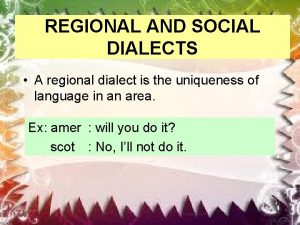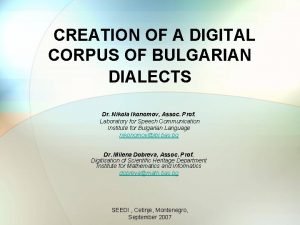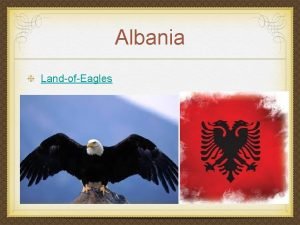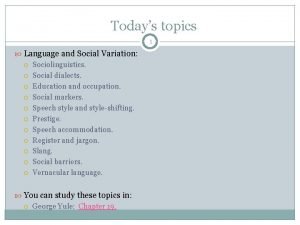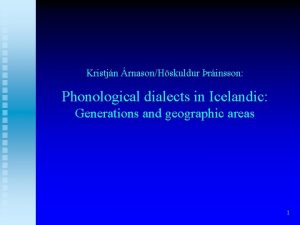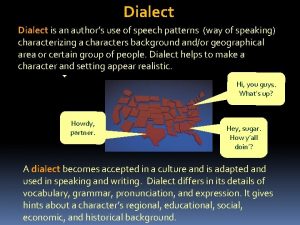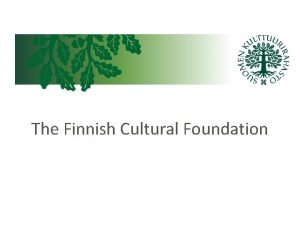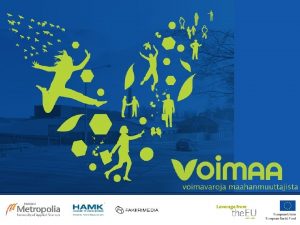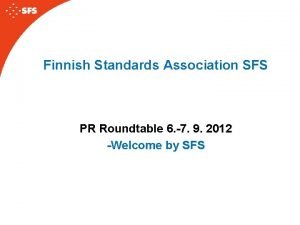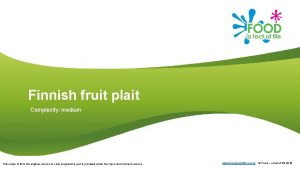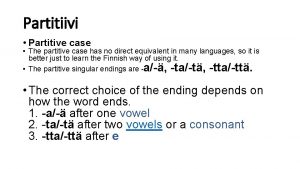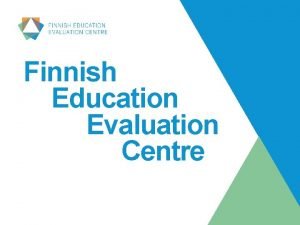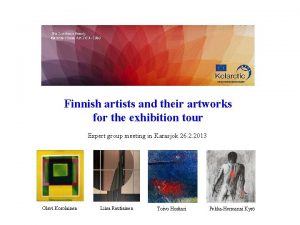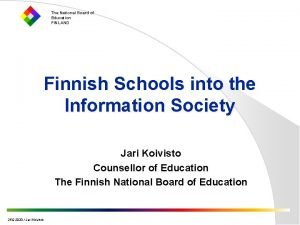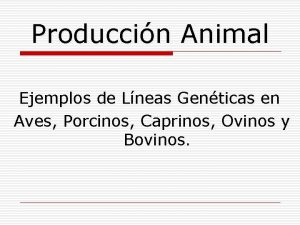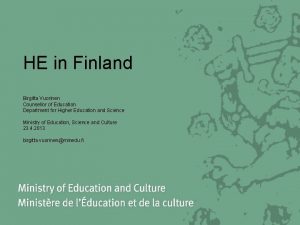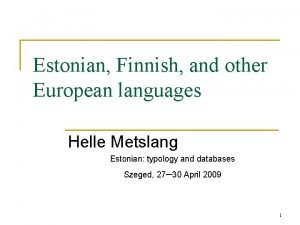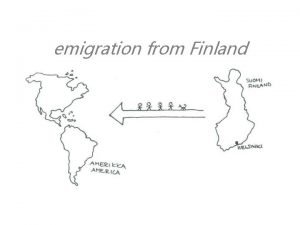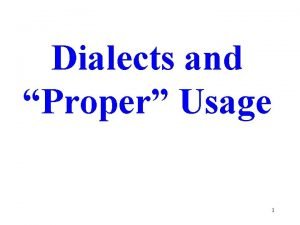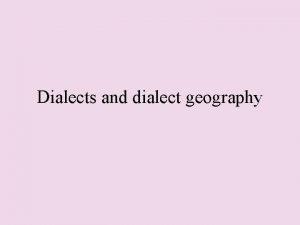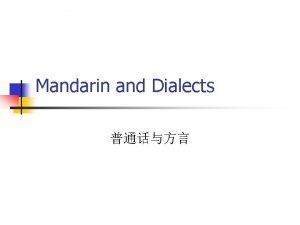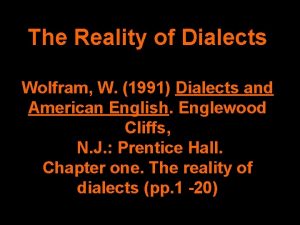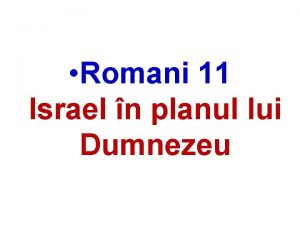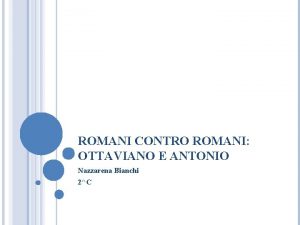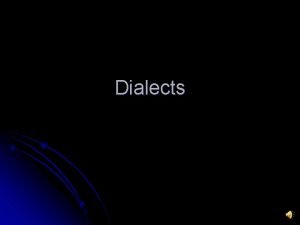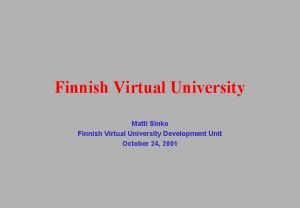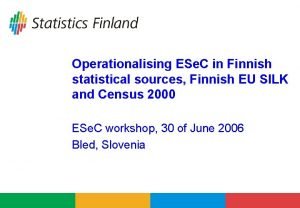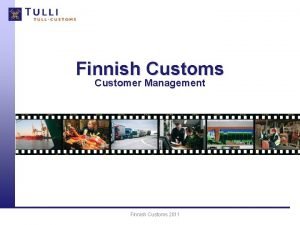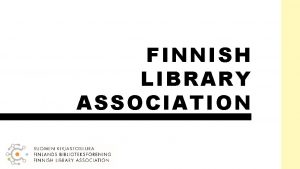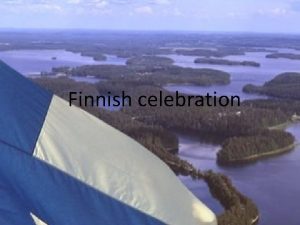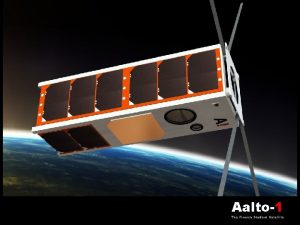Finnish Romani and other northern dialects of Romani























- Slides: 23

Finnish Romani and other northern dialects of Romani in the Baltic Sea area Erika Adamová, Kimmo Granqvist, Mirkka Salo, Anton Tenser ICML XIV, Graz 13. 09. 2013 www. helsinki. fi/yliopisto 2/24/2021 1

1. Background (1) • The Romani language and culture program started at UH as an experiment in fall 2009 at the Institute for Asian and African Studies • The first introductory courses in Romani language, basic course in Finnish Romani in spring 2010, continuation course in Finnish Romani in fall 2010, translation course in spring 2011 • Romani language and culture has been a minor subject (60 cr. ) at the Department of Finnish, Finno-Ugrian and Scandinavian Studies since August 2012. • The subject has rapidly evolved into an internationally significant and well-networked multidisciplinary cluster of academic research activities in Romani language and culture. www. helsinki. fi/yliopisto 2/24/2021 2

1. Background (2) Three research projects are ongoing (a–c); complementing research funding has applied for two projects (d–e): a) Finnish Romani and other Northern dialects of Romani in the Baltic Sea area (2013– 2016, funded by the Kone Foundation Language Programme) b) Language, identity and authenticity among the Roma in East Europe (2013– 2016, funded by European Studies Network at UH) c) Qualirom (2011 -2013, led by ECML/Graz) d) Micro-dialectology of Northeastern dialects of Romani (2014– 2017) e) Introduction to Romani language and its dialectology (2014– 2015) www. helsinki. fi/yliopisto 2/24/2021 3

1. Background (3) The subject has two permanently employed teachers (a university teacher and a university lecturer). In addition: • one post-doctoral researcher from USA; • four Ph. D students from Finland, Romania, Slovakia, and Bulgaria work mostly fulltime on the ongoing projects. The research conducted combines: • general and applied linguistics, phonetics: • several other disciplines, including Indo-European and Balkan studies, Slavonic and Germanic languages and Fennistics; • Sociology, Anthropology and History. The focus is on language structure and dialectology, variation and change, language contact, mixed languages, attrition, domains of use and discourse, sociolinguistic status, and language (education) policy. www. helsinki. fi/yliopisto 2/24/2021 4

Finnish Romani and… An Introduction (1) • A four-year (Jan 1, 2013–Dec 31, 2016) project led by university lecturer, docent Kimmo Granqvist; co-funded by the University of Helsinki and the Kone Foundation Language Program. • Linked to General Linguistics, studies of Indo-European, Balkan, Slavonic, Germanic and Baltic languages, and Fennistics. • The size of the Roma population in Poland, Russian Federation, the Baltic Countries, Germany and Finland is at least 300, 000. • Most Romani dialects spoken in the Baltic Sea area belong to northern dialects: • a meta-group divided into Northwestern (German and Polish Sinti and Finnish Romani) and Northeastern (most Romani dialects spoken in Poland, Lithuania, Latvia, Estonia and Russia) subbranches. www. helsinki. fi/yliopisto

Finnish Romani and… An Introduction (2) Figure 1. Romani dialects in the Baltic Sea Area. www. helsinki. fi/yliopisto

Practical outputs • corpora: 121 new dialect samples (CSC), dialect samples added to the RMS database (the largest corpus of northern and other dialects); • six printed/online books: atlas of Northern dialects of Romani in the Baltic Sea area, descriptive grammar of Finnish Romani, textbook of Romani language history, critical edition of 19 th century manuscripts of Finnish Romani, two Ph. D theses; • research papers and conference presentations, popular articles; • presentations at project events, and on the project website. www. helsinki. fi/yliopisto

Other goals • to contribute to researcher training and building up a Finnish research community in Romani Linguistics. • to contribute to building up an international center for research in the Romani language at the University of Helsinki. • to develop through collaboration new working practices, procedures and processes to implement the transference and communication of outcomes. • to establish research networks in the Baltic Sea area and Central European countries. • to advance the networking between institutions and NGOs working on the Romani language and other Roma issues, as well as Romani communities, in different countries in the Baltic Sea area and Central Europe. • to advance the participation of the Roma in the Baltic Sea area and their awareness of their linguistic heritage. www. helsinki. fi/yliopisto

The four sub-projects Sub-project Description A Data collection and analysis (2013– 2014) collection, transcription and analysis of dialect samples in Finland Sweden; Poland, Lithuania, Latvia, Estonia, and Russia B Finnish Romani and other Northern dialects (2014– 2016) a dialectological survey of northern dialects spoken in the Baltic Sea area C Descriptive grammar of Finnish Romani (2014– 2016) D History of Finnish Romani (2011– 2015) www. helsinki. fi/yliopisto

Project staff Name Area of Expertise Kimmo Granqvist Project manager Northern dialects and Northern Central dialects of Romani, Balkan Studies Anton Tenser Post doc researcher NE dialects of Romani, Romani dialectology Mgr. Erika Adamová Polish Romani, Ph. D thesis on Bergitka Roma Ph. D student, general linguistics MA Mirkka Salo Finnsh Romani, Ph. D thesis on Fennoromani as a means of discource Ph. D student, Finnish language A number of fieldwork assistants in Finland, Sweden, Estonia, Lithuania, Latvia and Poland. www. helsinki. fi/yliopisto

Subproject A (Jan 1, 2013 -Jun 30, 2014) • Goals: • Document Romani dialects spoken in the Baltic Sea area by collecting, checking and analyzing dialect samples. • Significantly enhance the amount of data freely available to researchers. • Methods: • The data collection will be based on the RMS (http: //romani. humanities. manchester. ac. uk/rms/) questionnaire ‒ A written permission to use the questionnaire has been received from the manager of RMS project, Professor Yaron Matras. • Practical outputs: • corpora: 121 new dialect samples (CSC), dialect samples added to the RMS database (the largest corpus of northern dialects). www. helsinki. fi/yliopisto

Subproject A (2) • The RMS questionnaire • Matras and Viktor Elšík (2001 b) and their colleagues for the purpose of eliciting data on Romani dialects. • 240 separate lexical items, 100 verb conjugation items, and over 700 phrases. • 1060 questions. • By design, the aim of the RMS questionnaire is to elicit enough data to be able to provide a basic grammatical description of the dialect. • Used in Finnish, Estonian, Polish, Latvian and Russian translations. www. helsinki. fi/yliopisto

Subproject A (3) www. helsinki. fi/yliopisto

Subproject A (4) Country Dialect(s) Samples in RMS database New samples collected in sub-project A Samples totally Finnish Romani Sweden Finnish Romani Germany Sinti 9 38 47 – 4 4 1 – 1 Poland Polska Roma, Sasytka, Sinti, Xaladytka Lithuania Litovska Roma, Polska Roma Latvia Loftika Roma, Fandari, Čuxny Estonia Čuxny 5 30 35 4 16 20 2 18 20 1 9 10 Russia TOTAL 2 21 3 121 Finland Xaladytka 5 142 www. helsinki. fi/yliopisto

Subproject A (5): Status Quo - Finland Sweden Coordinators: MA Mirkka Salo (January-July 2013), Adjunct Professor, University Lecturer Kimmo Granqvist (August, 2013 -) Research Assistants: 1 (2 -3) Currently collected: 7 samples (18 %), 7 locations, Informants 44 -72 years RMS Collected Planned www. helsinki. fi/yliopisto 2/24/2021 15

RMS Collected Planned Subproject A (6): Status Quo - the Baltics Coordinator: Ph. D Anton Tenser Estonia: Research Assistants: 1 Currently collected: 1 sample (Xaladytka), 1 location (11 %) Latvia: Research Assistants: 3 Currently collected: 15 samples, 12 locations (94 %), informants 40 -70 years Lithuania: Research Assistants: 3 Currently collected: 7 samples (Litowska), 7 locations (44 %), informants 22 -64 years www. helsinki. fi/yliopisto 2/24/2021 16

Subproject A (7): Status Quo - Poland Coordinator: Mgr. Erika Adamová Research Assistants: 1 Currently collected: 18 samples (Polska Roma), 18 locations (60 %) RMS Collected Planned www. helsinki. fi/yliopisto 2/24/2021 17

Subproject A (8): Fieldwork experiences • Finland: • Going through the questionnaire aborous for the elderly. • Slow lexical access of Romani words due to limited use of the language; usually the task becomes easier towards to end of the questionnaire. • The Baltics: • Some of the field workers are self-motivated, as the process of data collection is in line with their own line of research, some are not as mobile, and in addition are busy with regular jobs • Most of the field workers agree that it is much easier to elicit participation when there is an informant fee involved. • the Roma field-workers are more reserved than non-Roma, when they need to contact Roma from a group other than their own for an interview. www. helsinki. fi/yliopisto 2/24/2021 18

Subproject A (9): Fieldwork experiences • Poland: • The elderly informants have had difficulties remembering some of the elicited lexical items. • The Roma have been happy that their dialect has been recorded, the data collection has been well-received. www. helsinki. fi/yliopisto 2/24/2021 19

Subproject B: Finnish Romani and other northern dialects (2014 – 2017) • The atlas of northern dialects of Romani in the Baltic Sea area will describe the most important: • a) phonetic and phonological (ca. 10 maps), • b) morphological and grammatical category-related (ca. 100 maps), • c) lexical and lexicophonological (ca. 40 maps) features that are relevant for the classification and comparison of northern dialects. • The atlas will furthermore discuss isoglosses of northern dialects and Finnish Romani, and the relationship of northern dialects and northern central dialects of Romani. www. helsinki. fi/yliopisto

Sub-projects C and D: Descriptive grammar of Finnish Romani (2014– 2017), history of Finnish Romani (2011 – 2016): • Sub-projects C and D will be based on analysis of grammatical categories and relationships from the point of view of morpho-syntactic typology. • The sub-projects will also deal with descriptive and historical phonology. • The sub-projects will take an attitude to Romani dialectology, contact linguistics and the study of codeswitching, borrowing and attrition. • Sub-project C will look at Finnish Romani from a synchronic point of view. • In sub-project D, the focus is on developments that have taken place in Finland within the light of preserved documents since the end of the 18 th century. www. helsinki. fi/yliopisto

Other and future plans & co-operation • Two others projects, Microdialectology of Romani in the Baltics and Introduction to Romani language and its dialectology are awaiting funding. • International co-operation: University of Manchester, University of Graz, Charles University/Prague, VŠDa. SP Sv. Alžbety/Košice, University of Lund, Russian Academy of Science etc. www. helsinki. fi/yliopisto

Thank you for listening! www. helsinki. fi/yliopisto
 Difference between social dialect and regional dialect
Difference between social dialect and regional dialect German dialects and where they are spoken
German dialects and where they are spoken Dialects of middle english
Dialects of middle english Digital dialects
Digital dialects Albanian official language
Albanian official language Regional and social dialect
Regional and social dialect Icelandic dialects
Icelandic dialects What does your textbook say about speech dialects?
What does your textbook say about speech dialects? Finnish cultural foundation grants
Finnish cultural foundation grants Finland facts and information
Finland facts and information Sfs finland
Sfs finland Oats from finland
Oats from finland Finnish fruit plait
Finnish fruit plait Finnish korean war
Finnish korean war Partitive form
Partitive form Finecc
Finecc Finnish multinational company
Finnish multinational company Finnish artists
Finnish artists Finnish information security cluster
Finnish information security cluster National board of education finland
National board of education finland Finnish landrace ó finnsheep
Finnish landrace ó finnsheep Birgitta vuorinen
Birgitta vuorinen Itse sae
Itse sae Finnish countryside
Finnish countryside
